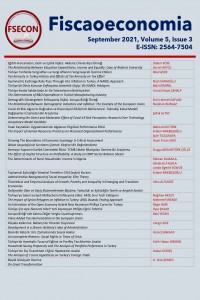Toplumsal Eşitsizliğin Yönetsel Temelleri: Elit (Seçkin) Kuramı
Administrative Background of Social Inequality: Elite Theory
Author(s): Erdem KirkbeşoğluSubject(s): Business Economy / Management, Social differentiation, Socio-Economic Research
Published by: Ahmet Arif Eren
Keywords: Elite Theory; Elites; Inequality;
Summary/Abstract: In social life, the concept of "inequality" has an important position in determining the shape of both individuals' relations with each other and their interactions with different communities. In particular, factors such as prestige, fame, wealth, income, profession, talent, race, ethnicity, gender and age affect the relations and social interactions of individuals with other individuals. In today's social structures, the effects of social and economic inequality provide unequal opportunities to different individuals within the group or groups that are a part of the society. These opportunities, which lead to inequality, cause some people to take a more active position in the decision-making process, depending on their access to respect and resources in the society. This effect, which puts individuals in a more effective position in decision-making processes, will not only result in the emergence of inequality, but also that power relations and power structures will be oriented in favour of certain people in society. The aim of this study is to describe the theoretical foundations of the elite theory, which is based on the balance between the rulers in the society and the ordinary people, both sociologically and administratively. The reasons and main causes of inequality between individuals who are part of societies, organizations and groups will be discussed with an inclusive perspective. The study aims to present a comprehensive analysis of the elite theory by combining the theoretical assumptions obtained from numerous studies on management and sociology literature.
Journal: Fiscaoeconomia
- Issue Year: 5/2021
- Issue No: 3
- Page Range: 990-1027
- Page Count: 38
- Language: Turkish

